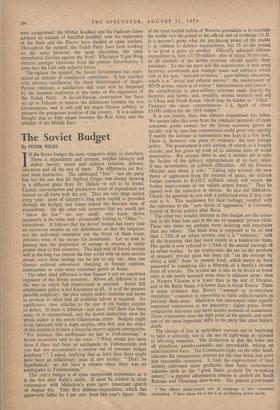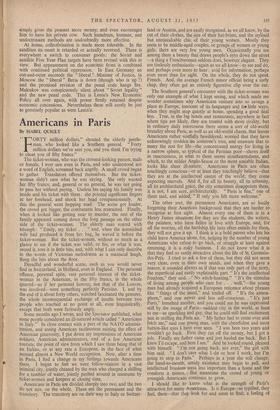The Soviet Budget
By PETER WILES IN the Soviet budget the same categories apply as elsewhere. There is expenditure and revenue, surplus (always) and deficit (never), . direct and indirect taxation, defence, education and all the rest of them. The differences are few, and most instructive. The celebrated " line "—not the party line but the one that Sir Stafford Cripps was salways drawing in a different place from Dr. Dalton—is not to be found. Capital, non-recurrent and productive items of expenditure are treated on all fours with the rest. They are very large indeed every year: most of industry's long term capital is provided through the budget, and forms indeed the heaviest item of expenditure. On the other side revenues that we would put " below the line " are very small: only loans, shown separately in the table, and—presumably lurking in " Other "- reparations. It follows that the Soviet budget has every year an enormous surplus on our definitions; or that the taxpayer, not the individual enterprise nor the buyer of State loans, provides most of the money for investment. Let us note in passing that the proportion of savings to income is vastly greater than in free countries. This high rate of forced savings will in the long run present the free world with its most serious threat, since these savings can be put to any use: they can finance political subversion, dumping in foreign markets, rearmament or even more consumer goods at home.
The other chief difference is that finance is not an important regulator of the Soviet economy. Above all, inflation -is not the way in which full employment is attained. Soviet full employment policy is not Keynesian at all. It is of the greatest possible simplicity : the plan simply orders factories and farms to produce so much that all available labour is required. No significance, then, attaches to the size of the budget surplus or deficit. if there is inflation—and since 1947 there has been none—it is unintentional, and the Soviet authorities view the whole matter in the purest Gladstonian terms. Budgets ought to be balanced with a slight surplus, they feel, and the object of this surplus is to have a financial reserve against emergencies. " For instance, that earthquake we had in Turkmenistan," a Soviet economist said to me once. " What would you have done if there had been an earthquake in. Turkmenistan and you had not accumulated a reserve out of previous budget surpluses ? " I asked, implying that at least then there might have been an inflationary issue of new money. " Don't be hypothetical: we did have 'a reserve when there was an earthquake in Turkmenistan."
This year's budget is of quite exceptional importance as it is the first after Stalin's death. It must be studied in close conjunction with Malenkov's even more important speech of August 8th. Take first defence iexpenditure, which has apparently fallen by 3 per cent. from last year's figure. One of the most foolish habits of Western journalists is to translate the rouble into the pound at the official rate of exchange (11.2). It is anyone's guess what the purchasing power of the rouble is in relation to defence expenditures, but 35 to the pound is as good a guess as another. Officially admitted defence expenditure is, then, £3,150 million : plus or minus 50 per cent., as all students of the Soviet economy should qualify their estimates. To this we must add the construction of new arms factories, aerodrome's and strategic roads and railways. which lurk in the item " national economy "; para-military education, which is a " social and cultural service "; the maintenance of MVD troops, which is of course " administration and justice "; the contributions to para-military activities made directly by factories and farms: and, possibly, atomic research and aid to China and North Korea, which may be hidden in " Other." Compare the more comprehensive U.S. figure of about £9,000 million for the 1954 budget.* It is not certain, then, that defence expenditure has fallen. We cannot infer this even from the emphatic promises of more consumer goods sooner; for the Soviet economy grows so quickly year by year that consumption could grow very quickly if merely the increase in rearmament was kept at a low level, There is, however, one piece of evidence: the new foreign policy. The government is only aiming, of course, at a longish detente, and has given up none of its ultimate aims of world domination. But detente there is, and it inclines me to take the decline of the defence appropriations at its face value. It has, nevertheless, its political difficulties. All the Finance Minister said about it was: " Taking into account the new threat of aggression from the enemies of peace, the defence budget amounts to R.110.2 milliard, which will ensure the further improvement of our valiant armed forces." Thus he passed over the reduction in silence. So also did Malenkov. Clearly the generals do not wish it publicised even if they con- sent to it. This tenderness for their feelings, coupled with the reference to the " new threat of aggression," is extremely typical of Soviet politics after Beria. The other two notable features in this budget are the reduc- tion in the State loan and in the tax on peasants' private plots. These two items are perhaps more irritating and unpopular than any others. The State loan is supposed to be no less than 1 /12th of an urban income, and it is " voluntary," with all the hypocrisy that that word entails in a totalitarian State, The quota is now reduced to 1/24th of the annual earnings or an urban worker. In the countryside, the tax on the products of peasants' private plots has been cut " on the average by about a half," from its present level, which seems to have amounted to something like a fifteenth of a family's incomq from all sources. The revised tax is also to be levied at lower rates in the newly annexed areas than in adjacent areas : thus in Western Ukraine it is lower than in the rest of Ukraine, and in the Baltic States it is lower than in Great Russia. There is some evidence that Beria's " attempt to re-introduce capitalism " consisted in opposition to farm collectivisation in pre6isely these areas. Malenkov has announced other equally important concessions to the peasantry : higher prices, lower compulsory deliveries and more lenient methods of assessment. These concessions were the high point of his speech, and mark one of the most important shifts in the party line since Stalin's death.
The change of line in agriculture consists not in beginning to take it seriously, but in the use of right-wing as opposed to left-wing remedies. The distinction is that the latter are all grandiose, pseudo-scientific and unworkable, relying on administrative force. The Communist right, on the other hand, tolerates the unregenerate peasant for the time being and gives him reasonable incentives. It finds the improvement of land already cultivated more profitable than flashy reclamation schemes such as the great Stalin projects for re-making nature,"—a gigantic afforestation scheme to abolish the South Russian and Ukrainian dust-bowls. The present government
* The official dollar/pound rate of exchange is also somewhat misleading. I have taken $4 to the £ as purchasing power parity.
simply gives the peasant more money, and even encourages him to have his private cow. Such humdrum, humane, and undoctrinaire methods are undoubtedly more effective. At home, collectivisation is made more tolerable. In the satellites its onset is retarded or actually reversed. There is everywhere a switch to consumer goods: the Soviet and satellite Five Year Plan targets have been revised with this in view. But appeasement on the economic front is combined with continued political oppression. In East Germany an out-and-outer succeeds the " liberal " Minister of Justice, in Moscow the " liberal " Beria is down (though who is up ?) and the promised revision of the penal code hangs fire. Malenkov was conspicuously silent about " Soviet legality " and the new penal code. This is Lenin's New, Economic Policy all over again, with power firmly retained despite economic concessions. Nevertheless these will surely be just as genuinely popular as were Lenin's.



























 Previous page
Previous page